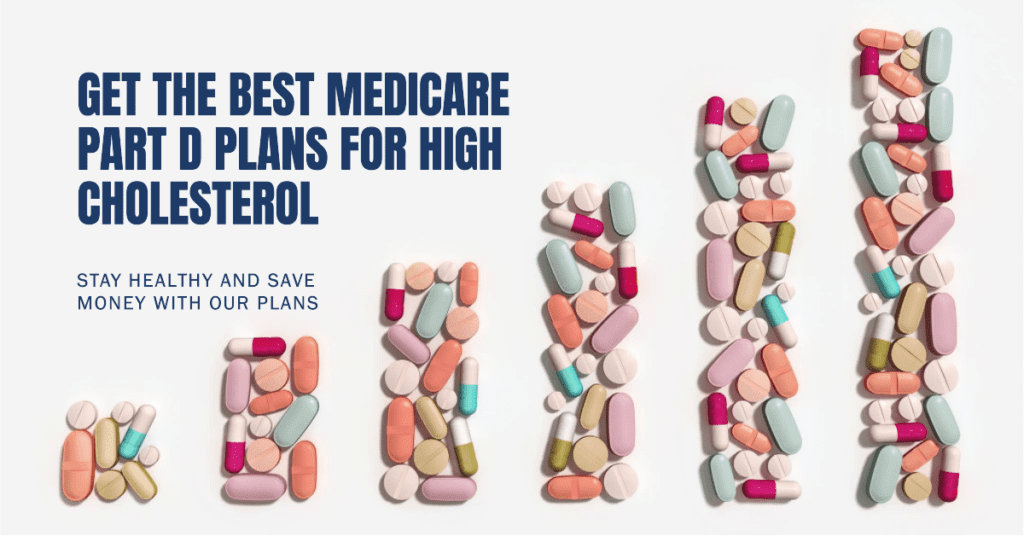Introduction
High cholesterol is a prevalent condition that stealthily causes serious health issues, primarily affecting the cardiovascular system. With a multitude of patients grappling with this silent ailment, understanding the available Medicare coverage becomes imperative.
This article illuminates the various Medicare plans and options tailored for individuals with high cholesterol, providing a guiding light for those seeking to navigate through the often complex and daunting landscape of health insurance.
Through a comprehensive exploration of Medicare coverage, beneficiaries with high cholesterol can make enlightened decisions, securing plans that not only cater to their specific medical needs but also align with their financial capacities.
Understanding High Cholesterol
Cholesterol isn’t all bad. In fact, it’s a vital substance our bodies need to build cells and make certain hormones. But like anything, it’s all about balance. Too much cholesterol, especially the type known as LDL or ‘bad’ cholesterol, can lead to heart issues over time.
What’s in a Type?
- LDL (Low-Density Lipoprotein): This is the notorious ‘bad’ cholesterol. When there’s too much of it floating around, it tends to build up on the walls of our arteries, which isn’t good news for our hearts.
- HDL (High-Density Lipoprotein): Meet the ‘good’ cholesterol. HDL is like a scavenger, hunting down LDL and taking it to the liver where it’s broken down and removed from the body.
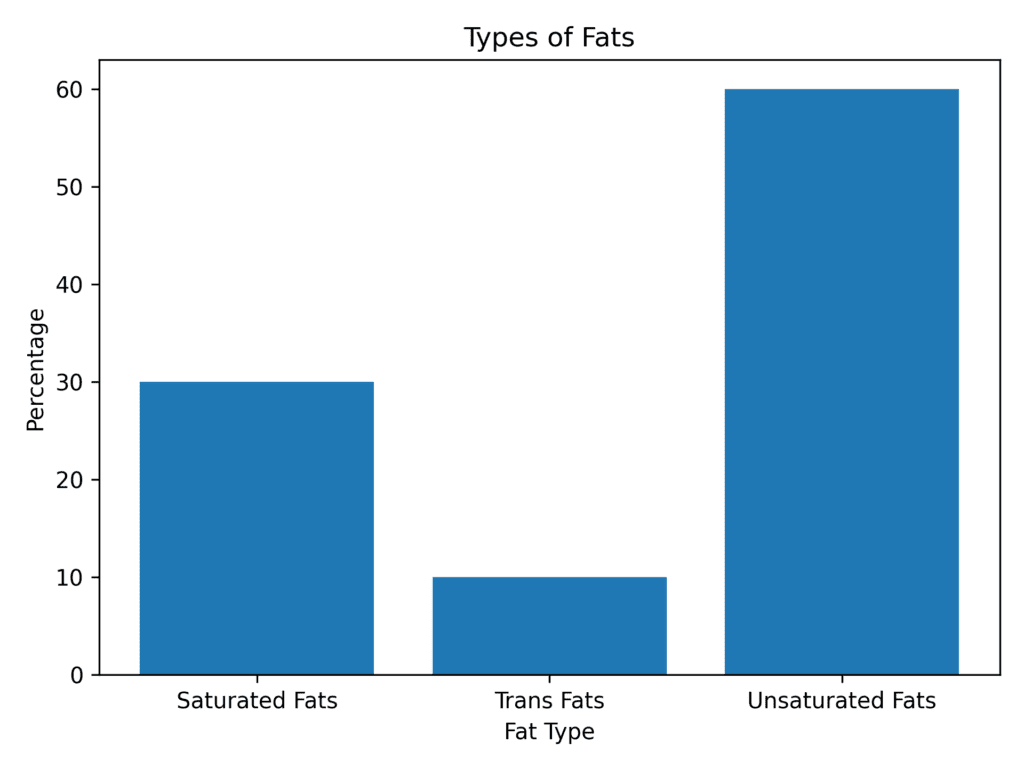
Who’s at Risk?
Anyone can have high cholesterol. It doesn’t discriminate, but some factors can ramp up your risk. Eating too much-saturated fat, carrying extra weight, not being active enough, smoking, and having diabetes can all push cholesterol levels up.
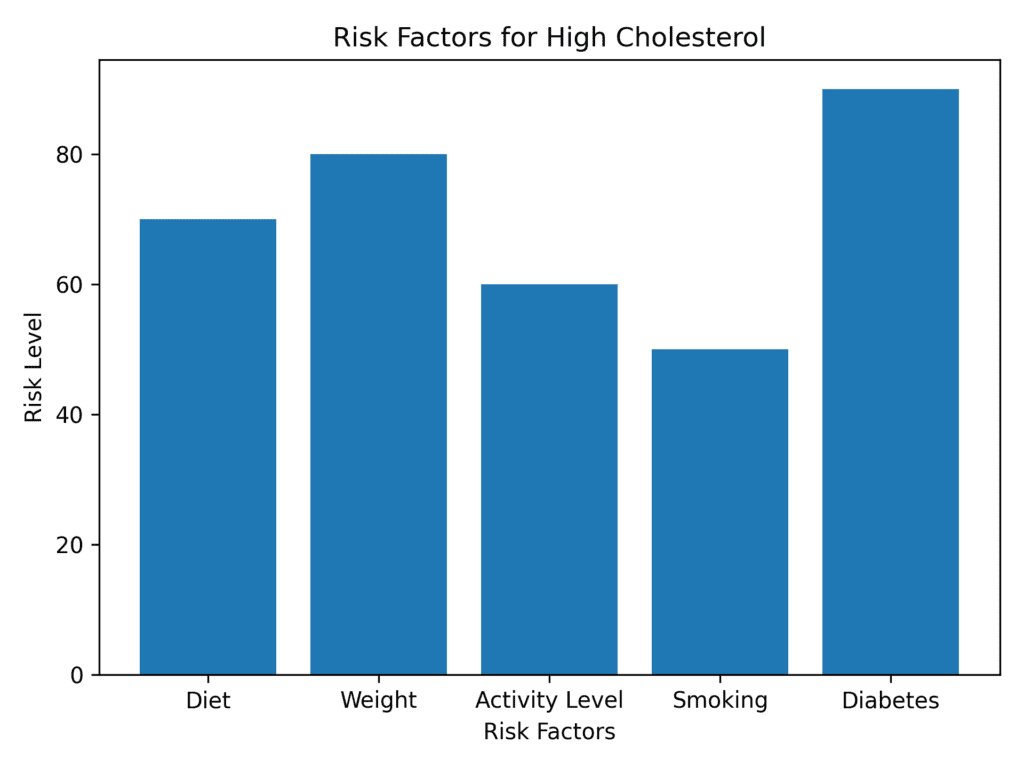
By the Numbers:
Per the CDC, a whopping 93 million adults in the U.S. have cholesterol levels that are higher than recommended. That’s nearly 38% of the population! And out of these, only about 55% are taking steps to manage their cholesterol.
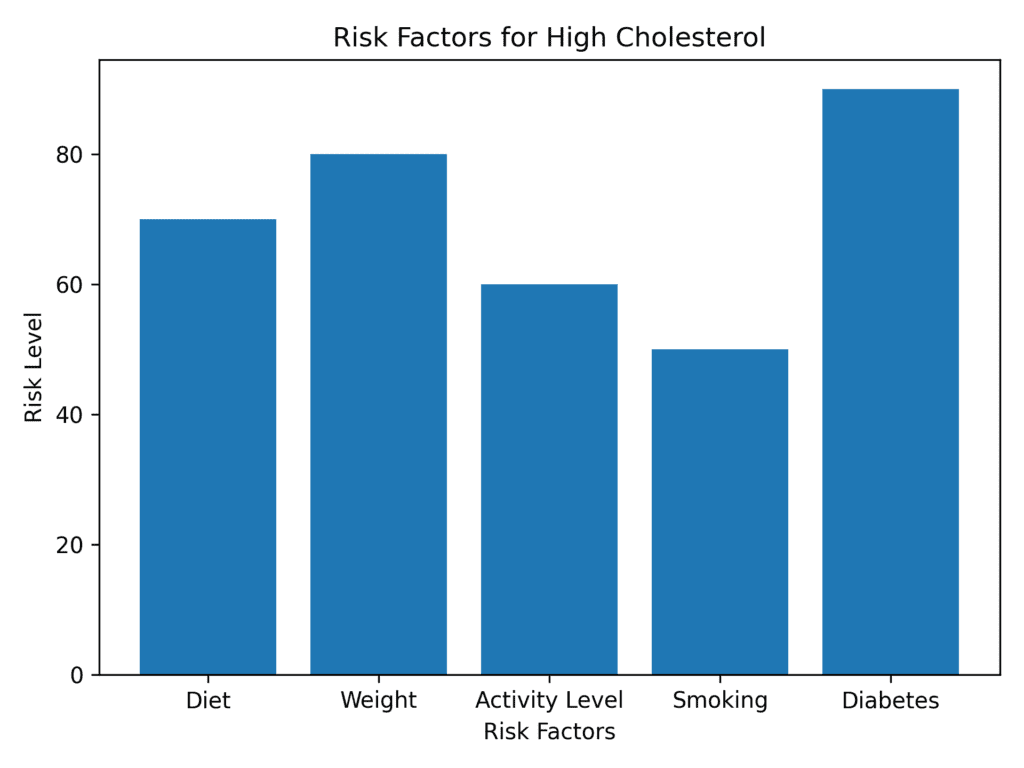
Why Manage It?
Keeping cholesterol in check is super important. It’s a key player in preventing heart disease, heart attacks, and strokes. With the right lifestyle changes and, if necessary, medication, it’s possible to control high cholesterol and lower the risk of heart-related issues.
Understanding cholesterol is the first step in managing it, and if you’re a Medicare beneficiary with high cholesterol, it’s crucial to know how your plan supports you in keeping your cholesterol levels healthy. So, let’s move forward and see how Medicare has got your back in this!
Medicare Basics
Understanding Medicare is your gateway to making savvy healthcare decisions, especially when managing high cholesterol. Let’s simplify Medicare for you.
The ABCD of Medicare
Medicare comes in four distinct parts, each serving different healthcare needs:
- Part A (Hospital Insurance): This covers your inpatient hospital stays, skilled nursing facilities care, and some home health care services.
- Part B (Medical Insurance): Here, you get coverage for certain doctors’ services, outpatient care, medical supplies, and preventive services.
- Part C (Medicare Advantage Plans): Think of this as an all-encompassing alternative to Original Medicare, with added perks.
- Part D (Prescription Drug Coverage): This is your go-to for prescription drug coverage, a vital part for anyone managing high cholesterol.
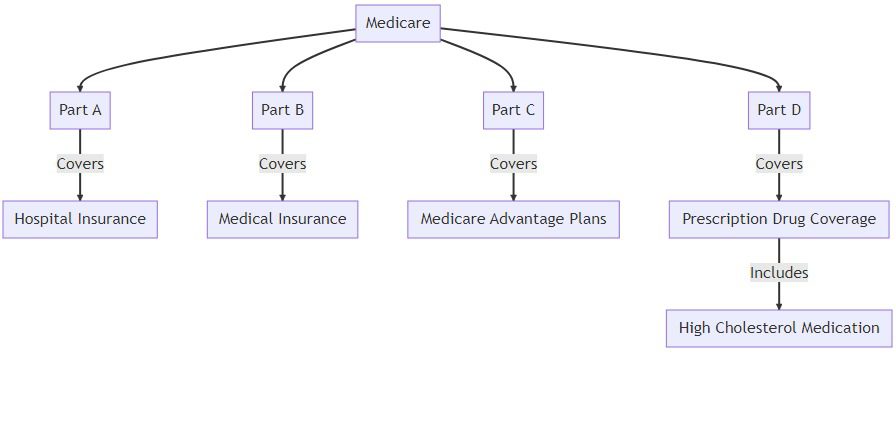
Why It’s Important for You
If you’re 65 or older, or under 65 with certain disabilities, Medicare is designed with you in mind. High cholesterol is a widespread issue, particularly among seniors, and Medicare is here to assist with the expenses involved in managing this condition.

Knowledge is Power
With a clear understanding of Medicare, you’re equipped to pick a plan that mirrors your health requirements and financial considerations. Whether you’re oscillating between Original Medicare and Medicare Advantage, or deciphering the prescription drug coverage maze under Part D, knowledge is your compass.
Tailoring Your Coverage
High cholesterol management is a meticulous task, and selecting the right Medicare plan is pivotal. With a spectrum of options available, you possess the autonomy to select a plan that not only echoes your health aspirations but also fortifies your high cholesterol treatment and medication coverage.
| Medicare Part | Coverage Focus | Relevance to High Cholesterol |
| Part A | Hospital Insurance | Inpatient care during cholesterol-related treatments |
| Part B | Medical Insurance | Doctor visits, cholesterol tests, preventive services |
| Part C | Comprehensive Plans | All-in-one plans with added benefits |
| Part D | Prescription Drugs | Coverage for cholesterol-lowering medications |
Navigating Medicare Part D
Medicare Part D is your ally in managing high cholesterol, ensuring you have access to necessary prescription medications without breaking the bank.
Understanding Part D
Medicare Part D is here to ease your prescription drug costs. Available to everyone with Medicare, it provides insurance coverage for various prescription drugs, including those vital for managing high cholesterol.
How It Works for You
With Part D, you have options. You can opt for a stand-alone Prescription Drug Plan (PDP) or choose a Medicare Advantage Plan that includes drug coverage. Each plan is unique, so you have the flexibility to select one that aligns with your medication needs and financial situation.
What’s Covered?
Part D plans must cover a broad spectrum of prescription drugs. Each plan comes with a formulary, a list of covered drugs. For high cholesterol management, commonly prescribed drugs like statins are usually included.
| Drug Tier | Type of Drug | Cost | Example |
| Tier 1 | Generic Drugs | Low Co-pay | Statins |
| Tier 2 | Preferred, Brand | Moderate Co-pay | Zocor |
| Tier 3 | Non-preferred, Brand | Higher Co-pay | Crestor |
| Specialty Tier | High Cost Prescription Drugs | Highest Co-pay | – |
Note: The costs vary by plan, and the examples provided are illustrative.
Your Costs
Part D involves a monthly premium, an annual deductible, and co-payments or coinsurance for your prescriptions. For instance, the average premium for Part D plans was around $33 per month in 2021.
Extra Help for You
If your income and resources are limited, you might be eligible for Extra Help. This program is a financial boon, assisting you with Part D costs, making your high cholesterol medications even more affordable.
Why It’s Essential
Medicare Part D is not just a plan; it’s peace of mind. With the financial burden eased, you can focus on managing your high cholesterol effectively, ensuring you lead a healthy, fulfilling life without the constant worry about medication costs.
Medication Therapy Management Program
Managing high cholesterol often involves using various medications. The Medication Therapy Management Program (MTMP) is here to assist you, providing personalized support to ensure you use your medications effectively.
What is MTMP?
MTMP is not merely a program; it’s a service tailored for individuals dealing with multiple health conditions, taking different medications, and facing significant drug costs.
Eligibility Criteria
To benefit from MTMP, you need to:
- Have three or more chronic conditions, including high cholesterol.
- Take eight or more maintenance medications.
- Spend over $4,044 annually on prescription drugs.
| Eligibility Factor | Criteria |
| Chronic Conditions | 3 or more |
| Maintenance Medications | 8 or more |
| Annual Drug Costs | Over $4,044 |
MTMP’s Offerings
MTMP supports you by providing comprehensive medication reviews, quarterly targeted medication reviews, and creating personal medication lists, ensuring you are on the right track with your medications.
Enrollment Process Step-by-Step
- Automatic Enrollment: If you meet the eligibility criteria, you’ll be enrolled in MTMP automatically without the need for lengthy forms or processes.
- Welcome Letter: A pharmacist will send you a welcome letter after reviewing your medication history, highlighting potential medication-related issues.
- Invitation for Review: The welcome letter includes an invitation for a comprehensive review, where you can discuss your medications in detail and share your experiences.
- Voluntary Participation: Although enrollment is automatic, participation is voluntary. You can opt out at any time if you feel MTMP isn’t right for you.
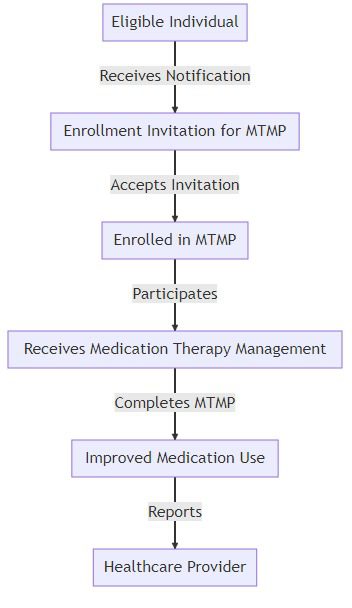
Why Participation Matters
Joining MTMP gives you access to a medication strategist who offers personalized support, helping you understand and effectively use your medications to control high cholesterol and improve overall health.
The Outcome
Participating in MTMP allows you to gain control and understanding of your medications, making you aware of your regimen, potential side effects, and expected benefits, which empowers you to manage your health confidently.
Opt-Out Option
Remember, participation in MTMP is voluntary. If you decide it’s not for you, opting out is simple and straightforward.
Medicare Support for High Cholesterol Patients
Living with high cholesterol requires diligent management and consistent medication intake. Medicare extends its support to individuals with high cholesterol through various plans and programs designed to alleviate the financial burden and promote effective treatment adherence.
Medicare’s Comprehensive Approach
Medicare adopts a holistic approach to support beneficiaries with high cholesterol. It not only covers the costs associated with prescription drugs through Part D but also provides access to essential services and programs like MTMP, designed to optimize medication use and improve health outcomes.
Prescription Drug Coverage
Medicare Part D plays a pivotal role in making prescription drugs accessible and affordable for beneficiaries. It covers a wide range of medications, including those crucial for managing high cholesterol. The plans under Part D vary, each with a unique formulary listing the covered drugs. Beneficiaries are advised to review these formularies carefully to ensure their medications are included.
Cost Dynamics
The cost associated with Part D plans is multifaceted, encompassing monthly premiums, annual deductibles, and co-payments or coinsurance for prescriptions. For example, in 2021, the average premium for Part D plans was approximately $33 per month. However, these costs can vary significantly from plan to plan, and beneficiaries are encouraged to select plans that best align with their financial and medical needs.
Extra Help Program
For beneficiaries with limited income and resources, Medicare offers the Extra Help program. This initiative assists eligible individuals in covering the costs associated with Part D, including premiums, deductibles, and prescription co-payments. It is a valuable resource that can make high cholesterol medications and overall Part D plans more affordable for many.
Medication Therapy Management Program
As discussed, the MTMP is a valuable service for beneficiaries taking multiple medications for various conditions, including high cholesterol. It provides personalized support, helping individuals understand their medications, avoid potential drug interactions, and adhere to their prescribed regimens effectively.
Importance of Adherence
Adherence to prescribed medications is crucial for managing high cholesterol effectively. Medicare’s support mechanisms, including Part D and MTMP, are designed to promote adherence by making medications more affordable and providing the necessary support to use these medications effectively.
Informed Decision-Making
Medicare provides various resources and tools to assist beneficiaries in making informed decisions regarding their prescription drug plans. Through the official Medicare website and other platforms, individuals can compare different Part D plans, explore formularies, and understand the costs associated with each plan, facilitating informed and beneficial decision-making.
Proactive Management
With the support provided by Medicare, beneficiaries with high cholesterol can proactively manage their condition. The financial assistance, coupled with educational and support services, empowers individuals to adhere to their treatment plans confidently and improve their health outcomes over time.
Importance of Managing High Cholesterol
High cholesterol is more than just a number on a medical report; it’s a significant health concern that can have far-reaching implications if not managed effectively. With the backing of Medicare and its comprehensive support, those diagnosed with this condition can confidently navigate their treatment journey. Let’s delve deeper into understanding the gravity of high cholesterol and the importance of its management.
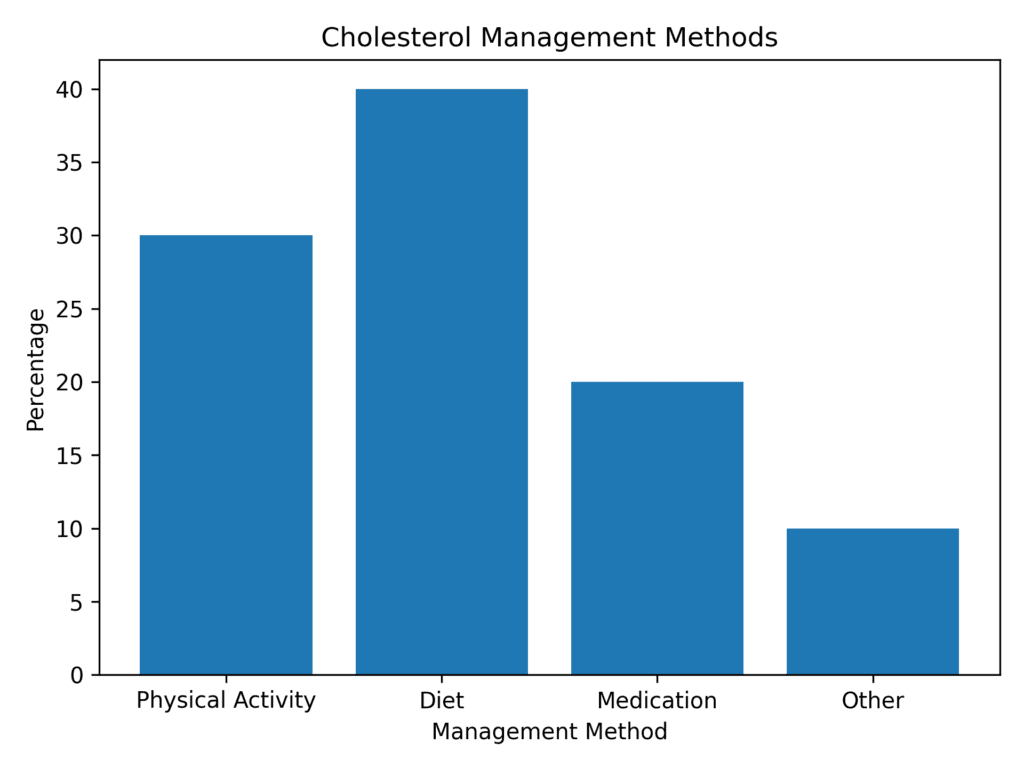
The Silent Threat
High cholesterol is often dubbed a silent killer. Why? Because it doesn’t typically present with overt symptoms, yet it’s a major contributor to cardiovascular diseases, including heart attacks and strokes. According to the CDC, high cholesterol has no symptoms, making many unaware of their elevated levels. A simple blood test is all it takes to check cholesterol levels.
The Numbers Speak
The statistics surrounding high cholesterol are eye-opening:
- Between 2017 and 2020, 10% of US adults aged 20 or older had total cholesterol levels above 240 mg/dL.
- About 17% had high-density lipoprotein (HDL, or “good”) cholesterol levels below 40 mg/dL.
- Slightly more than half of U.S. adults (54.5%, or 47 million people) who could benefit from cholesterol medicine are currently taking it.
- A staggering 86 million U.S. adults aged 20 or older have total cholesterol levels above 200 mg/dL, with nearly 25 million having levels above 240 mg/dL.
- Alarmingly, about 7% of U.S. children and adolescents aged 6 to 19 also have high total cholesterol.
| Statistic | Value |
| US adults with cholesterol >240 mg/dL (2017-2020) | 10% |
| US adults with HDL <40 mg/dL | 17% |
| US adults benefiting from cholesterol medicine | 54.5% |
| US adults with cholesterol >200 mg/dL | 86 million |
| US children & adolescents with high cholesterol | 7% |
Role of Medication
Medications, especially statins, are often the first line of defense against high cholesterol. They help reduce the levels of low-density lipoprotein (LDL) cholesterol in the blood, minimizing the risk of cardiovascular diseases. With Medicare’s Part D, these medications become more accessible and affordable, ensuring that those in need can benefit from them.
Lifestyle Choices Matter
While medications play a crucial role, lifestyle choices can’t be ignored. A balanced diet, regular exercise, maintaining a healthy weight, and avoiding tobacco can significantly impact cholesterol levels. These lifestyle modifications, when combined with medications, offer a holistic approach to managing high cholesterol.
Regular Monitoring: A Must
Routine check-ups and blood tests are essential for those with high cholesterol. These tests help track the effectiveness of treatment plans and make necessary adjustments. Medicare provides coverage for cholesterol screening tests, ensuring beneficiaries can regularly monitor their levels.
The Power of Support
A strong support system, be it from healthcare providers, family, or friends, can make a world of difference. Coupled with Medicare’s comprehensive coverage and support programs, this network provides a safety net, allowing individuals to manage their condition with confidence.
Making Educated Choices
Knowledge is power. With resources and support from Medicare, beneficiaries can make informed decisions about their health. From choosing the right Part D plan to understanding the nuances of their condition, Medicare ensures that those with high cholesterol are well-equipped to make choices that benefit their health.
Looking Ahead
Effective management of high cholesterol is not just about the present; it’s an investment in future health. With the right mix of medications, lifestyle changes, and support, individuals can lead healthy lives, minimizing the risk of cardiovascular diseases.
Understanding Medicare Part D
Medicare Part D is a linchpin for individuals grappling with high cholesterol, providing substantial support for their medication needs. This segment will demystify Medicare Part D, spotlighting its importance for those reliant on prescription medications to manage high cholesterol.
What is Medicare Part D?
Medicare Part D, a voluntary program, offers beneficiaries prescription drug coverage. Everyone with Medicare is eligible, aiding in the costs associated with prescription drugs, premiums, and other out-of-pocket expenses.
How It Works
- Coverage: Part D covers a spectrum of both brand-name and generic prescription drugs at participating pharmacies.
- Providers: Insurance companies and other private firms approved by Medicare offer this coverage.
- Enrollment: Beneficiaries can enroll in a Medicare Prescription Drug Plan, integrating it into their broader Medicare strategy.
| AspectDetailsCoverageBrand-name and generic drugsProvidersApproved insurance companies and private firmsEnrollmentOpen to all Medicare beneficiaries |
Essential for High Cholesterol Patients
For those with high cholesterol, prescription medications are often indispensable. Medicare Part D is vital, covering various cholesterol-lowering medications, including statins, making treatment accessible and affordable.
Enrollment Steps
- Initial Enrollment: When first eligible for Medicare.
- Annual Election Period: From October 15 to December 7 each year, allowing for plan changes.
Costs Breakdown
- Premiums: Monthly fees for the plan.
- Deductibles: Amount paid before the plan begins to pay.
- Copayments/Coinsurance: Amount paid for each prescription.
| Cost Type | Description |
| Premiums | Monthly plan fees |
| Deductibles | Out-of-pocket before plan pays |
| Copayments/Coinsurance | Cost per prescription |
The Coverage Gap
The “donut hole” or coverage gap is a temporary limit on what the drug plan will cover. It begins after you and your drug plan have spent a certain amount on covered drugs.
Extra Help Program
For those with limited resources, the Extra Help program assists with Part D costs, ensuring that essential medications are accessible without financial strain.
Choosing the Right Plan
Selecting an appropriate Part D plan is crucial. Consider the following:
- Formulary: Does the plan cover your medications?
- Costs: Understand the premiums, deductibles, and copayments.
- Pharmacy Access: Can you use your preferred pharmacy?
| Consideration | Question to Ask |
| Formulary | Are my drugs covered? |
| Costs | What are the associated costs? |
| Pharmacy Access | Is my pharmacy accessible? |
Annual Review Importance
Healthcare needs and plans evolve. Conduct an annual review of your Part D plan to ensure it aligns with your current needs, making changes during the Annual Election Period if necessary.
Medicare Part D Plans for High Cholesterol
For individuals grappling with high cholesterol, selecting the right Medicare Part D plan is pivotal. This section will guide you through the process, ensuring you make an informed decision that aligns with your medication needs and financial considerations.
Why Specific Plans for High Cholesterol?
High cholesterol management often necessitates specific prescription drugs. Different Part D plans offer varying coverage for these medications, making it essential to choose a plan that adequately covers the drugs you need at an affordable rate.
Key Drugs Covered
Most Medicare Part D plans cover a range of drugs essential for managing high cholesterol, including but not limited to:
- Statins: Atorvastatin, Simvastatin, Lovastatin
- PCSK9 inhibitors: Evolocumab, Alirocumab
- Other cholesterol medications: Ezetimibe, Niacin, Fenofibrate
| Drug Type | Examples |
| Statins | Atorvastatin, Simvastatin, Lovastatin |
| PCSK9 Inhibitors | Evolocumab, Alirocumab |
| Others | Ezetimibe, Niacin, Fenofibrate |
Plan Costs
Medicare Part D plans come with various costs, including premiums, deductibles, and copayments. These costs can significantly impact your budget, so it’s crucial to understand them before selecting a plan.
- Premiums: The monthly cost you pay for your plan.
- Deductibles: The amount you pay for your medications before your plan begins to pay.
- Copayments/Coinsurance: Your share of the cost of each medication.
Finding the Right Plan
Choosing the right plan requires careful consideration of your specific needs and preferences. Here are steps to guide you:
- List Your Medications: Write down all the medications you take, including dosages.
- Use the Medicare Plan Finder: This tool helps you find plans that cover your medications.
- Compare Costs: Look at the premiums, deductibles, and copayments of each plan.
- Check Pharmacy Networks: Ensure your preferred pharmacy is in the plan’s network.
- Review Star Ratings: Consider the plan’s overall rating and performance.
Extra Help for Eligible Individuals
If you have limited income, you might qualify for Extra Help, a program designed to assist with Medicare prescription drug plan costs. This program can significantly reduce your out-of-pocket expenses, making your high cholesterol medications more affordable.
Annual Review and Changes
Your medication needs and available plans may change over time. Conduct an annual review of your Medicare Part D plan during the Open Enrollment Period, from October 15 to December 7, to ensure it still meets your needs. During this period, you can make necessary changes to your plan to better suit your current situation.
Medicare Part D prescription drug plans for people with high cholesterol
For individuals with high cholesterol, Medicare Part D prescription drug plans are invaluable. These plans cover various medications essential for managing high cholesterol, providing financial relief and access to necessary treatment. Understanding the specifics of these plans, including the covered drugs and associated costs, is crucial for making an informed decision that best supports your health and financial needs.
Wrapping Up
Understanding high cholesterol and its implications is vital for maintaining good health. Medicare Part D plays a pivotal role in this scenario, providing essential support for those requiring prescription medications. With a variety of plans available, it offers options to cater to diverse needs and preferences.
Selecting the right Medicare Part D plan is crucial. It requires a careful evaluation of your specific medication needs and financial circumstances. Tools like the Medicare Plan Finder and assistance programs like Extra Help are available to guide you in making decisions that align with your requirements.
It’s also imperative to review your Medicare Part D plan annually to ensure it continues to meet your evolving healthcare needs. With the right plan in place, managing high cholesterol becomes a more manageable and less financially stressful endeavor.
For more in-depth understanding, revisit the sections of this article, and for personalized guidance, consult with Medicare representatives or healthcare providers. Armed with knowledge and the right support, you can confidently steer through your healthcare journey, keeping high cholesterol in check and enjoying a healthier life.

